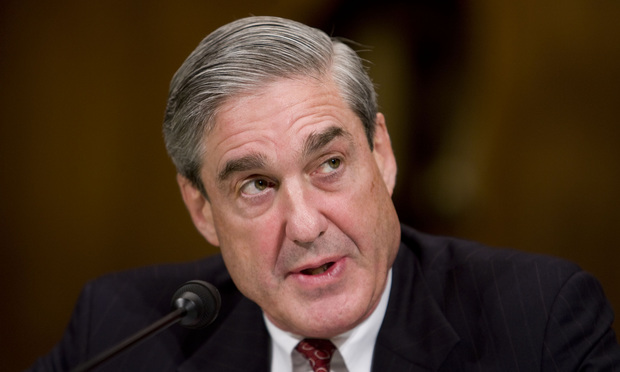 FBI director Robert Mueller listens to comments and questions from the Senate Judiciary Committee during a hearing on FBI Oversight. December 6, 2006. Photo by Diego M. Radzinschi/LEGAL TIMES.
FBI director Robert Mueller listens to comments and questions from the Senate Judiciary Committee during a hearing on FBI Oversight. December 6, 2006. Photo by Diego M. Radzinschi/LEGAL TIMES.
President Donald Trump’s lawyers argued to federal investigators that they have no case against Trump for obstruction of justice, but former federal prosecutors and white-collar attorneys are not convinced.
In June, the president’s lawyers presented two legal memos to Robert Mueller, the special counsel investigating Russian interference in the 2016 elections and possible collusion with the Trump campaign, according to a report from the Wall Street Journal Thursday. Various news reports in the past few months indicated Mueller, who has empaneled a grand jury in Washington, D.C., may be looking into possible obstruction-of-justice charges after the president fired then-FBI Director Jim Comey in May.
One memo, according to the report, argues the president could not have obstructed justice by firing Comey because the president has inherent authority to hire and fire at will. The other said Comey would be an unreliable witness, evidenced by his leaks to the media and past behavior.
But former federal prosecutors and white-collar defense attorneys are unconvinced. Here are three things to know about this development in the ongoing Trump-Russia-Mueller saga:
This is a normal part of the process, and avoiding indictment is the goal at this stage.
Keeping a dialogue with federal investigators is normal at this stage, said Sam Buell, a former lead prosecutor on the Justice Department’s Enron Task Force and current criminal law professor at Duke University School of Law.
“There are no rules or procedures for this, just norms, which are pretty well settled and known to everyone in the practice space,” Buell said in an email.
He noted the memos were presented in June, likely before Mueller would have made any real decisions about how important the obstruction piece of the investigation may be. Buell added prosecutors “always allow these pitches” because “what’s to lose in previewing defense strategy?”
While it’s true Trump’s attorneys may be showing their defense cards ahead of time, Buell explained there’s a strategy behind the memos. The lawyers are likely pitching to Mueller that pursuing obstruction-of-justice charges is a waste of time and he should move on.
William Jeffress, a partner at Baker Botts who defends corporations and individuals in federal criminal proceedings, said it’s no surprise Trump’s lawyers would put everything on the table now.
“The No. 1 goal at this stage is to avoid an indictment, particularly in a case where a mere indictment has all sorts of consequences,” Jeffress said. “The defense lawyers would certainly leave no stone unturned.”
The president definitely has authority to fire Comey, but intent is key.
One of the memos reportedly argued that because Trump has inherent authority under the Constitution to hire and fire whomever he wants, firing Comey could not be obstruction of justice.
Peter Zeidenberg, a partner at Arent Fox and former federal prosecutor, said that while it’s true the president has such authority, it’s a weak argument because it’s the intent behind an act that matters here.
“If you want to throw your computer in a river that’s perfectly fine. … If you’re doing it to hide evidence, then you could be guilty of obstruction of justice,” Zeidenberg said. “To me, it’s the same thing as firing Comey. If you think, he’s on my tail and he’s gonna get me, then firing him may not be fine.”
Attacking Comey’s credibility is probably not the best move.
Arguing that Comey is an unreliable witness is flimsy at best, several attorneys said. That’s because Comey has a history of commitment to law enforcement, kept contemporaneous memos of his interactions with the president and testified on what happened under oath before Congress.
Renato Mariotti, a former federal prosecutor and partner at Thompson Coburn, said Trump’s lawyers “almost have to” attack Comey’s credibility, because if there were an obstruction-of-justice case, so much of it would rely on what occurred between Comey and the president. He said he doubts it would be a viable argument going forward, but it could have an influence in the court of public opinion.
“If I was putting together an obstruction case, the credibility of Mr. Comey would be low on my list of concerns,” Mariotti said. “So I can’t believe that the president’s lawyers really thought that they would convince Mueller that Comey is not a credible witness.”
Mariotti said the memo may serve as a signal to Mueller that the lawyers will continue trying to show Comey is unreliable, and that a “potential downside” of the investigation is the lawyers “would do whatever they could to hurt Comey’s credibility.”
Zeidenberg said he thought the argument was “so frivolous,” it could backfire by undercutting the credibility of Trump’s lawyers.
“It’s not an argument that passes the straight-face test,” Zeidenberg said. “If you want to make that argument to a jury, make it to a jury. But you’re never going to persuade Mueller and his team [not to] believe what Comey’s telling [them].”




